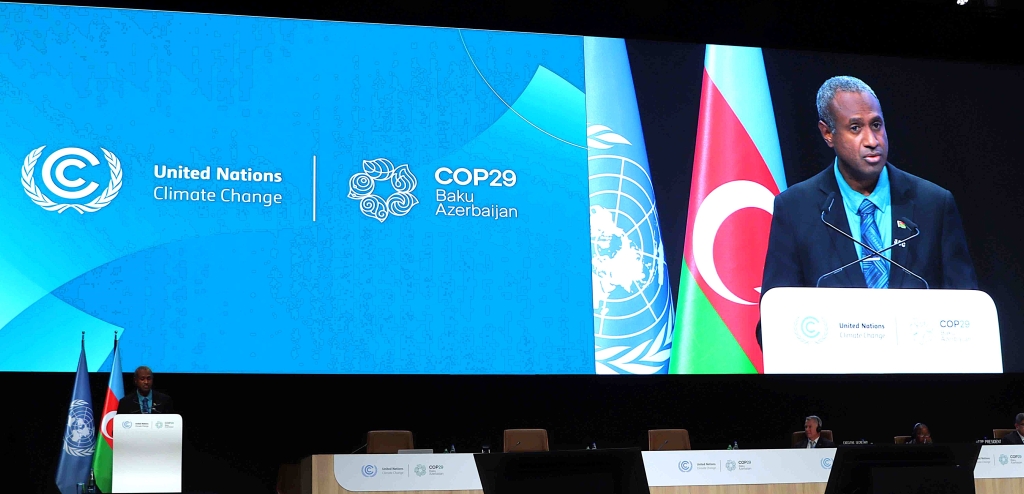
20 November 2024, Baku Azerbaijan - As the clock ticks towards the end of COP29 in Baku Azerbaijan, Vanuatu has expressed deep concerns about the lack of progress made on some key ticket items, including the New Collective Quantified Goal (NCQG) on climate finance, the Mitigation Work Program (MWP) and Global Goal on Adaptation (GGA).
Speaking during the resumed High Level session at the Nizami plenary on Wednesday, Mr. Abraham Nasak, Acting Director General of Vanuatu’s Ministry of Climate Change, said these key items are critical to the survival the people of Vanuatu, and the billions of people around the world whose lives depend on it.
“We can negotiate as parties here, but it is clear, we cannot negotiate with climate change,” Mr Nasak said. “Our children and youths are expecting us to do the right and needful, reverse and stop greenhouse gas emissions to rein in climate change.”
Vanuatu is amongst Pacific communities who bear the brunt of tropical cyclones, earthquakes, volcanic eruptions, drought and flash floods, amongst other impacts of human-induced climate change.
Last year, the Pacific country with a population of just over 330,000 people, was hit by two severe tropical cyclones within 48 hours. Tropical Cyclone Judy struck central and northern Vanuatu first, reaching Category 4 intensity. Category 5 Severe Tropical Cyclone Kevin followed a more westerly trajectory, smashing Efate island and the islands of Vanuatu’s southernmost province, Tafea.
Aside from more frequent and severe cyclones, the country is already affected by marine heatwaves, extreme rainfall, with more changes projected to impact Vanuatu in the future.

In Baku, Vanuatu as the Chair of Pacific Small Island Developing States (PSIDS), is supported by the Secretariat of the Pacific Regional Environment Programme (SPREP), to coordinate the One Pacific Voice advocating for more urgent climate action to tackle the scourge of climate change.
“These COPs have been going on for a very long time,” said Mr Nasak. He reminded that as world leaders gather at COP29, the International Court of Justice (ICJ) is preparing to hear unprecedented proceedings on the obligations of States regarding climate change, and the legal consequences of their actions and inactions.
The outcome of the hearing could have major knock-on effects in terms of countries’ obligations around climate-harming emissions and human rights. It could also open up the possibility that international climate commitments can be legally enforced.
The decision by the Government of Vanuatu is a result of sheer frustration at the global community’s rhetoric and action, or rather the lack of it, on climate change. At COP29, Vanuatu reminded that it cannot be business as usual.
“With the outcome of the first GST in Dubai last year, we are clearly off track with respect to the goals of the Paris Agreement and the window for meaningful change is closing. The first GST must be forward looking, ambitious and inform the next NDCs, and include tripling of renewable energy goal by 2030, phase out fossil fuels, and mobilize finance for adaptation, mitigation, and loss and damage consistent with keeping global temperature rise below 1.5 degrees,” Mr Nasak said. “1.5 is non-negotiable, hence, Means Of Implementations – Finance, Technology and Capacity Building are key to deliver on our global commitments considering the special circumstances of SIDS like Vanuatu.
“For a highly vulnerable country such as Vanuatu, financial resources mobilised to address adaptation, mitigation and Loss and Damage must be significantly grant-based, predictable, transformational and logical without any difficult access processes as experienced with the GCF, GEF and other multilateral funds.”
On climate finance and the NCQG, Vanuatu called on governments to agree on a new goal that truly responds to the needs of developing countries.
Vanuatu also highlighted the inextricable connectivity between climate change and the ocean, noting its concerns with the negative impacts ocean ecosystems, fishery resource, islands and livelihoods.
“We therefore urge and call for more serious treatment of ocean in the UNFCCC bodies and processes and especially at this session.”
The 29th Conference of the Parties to the UN Framework Convention on Climate Change (UNFCCC) is taking place from 11-22 November 2024 in Baku, the capital city of Azerbaijan.
It is being attended by Pacific leaders and their delegations, who are advocating for the survival of Pacific communities who continue to be at the forefront of climate change impacts.
A key part of amplifying the One Pacific Voice at COP29 is the Moana Blue Pacific Pavilion and the Pacific Delegation Office.
The Moana Blue Pacific Pavilion at COP29 is a Pacific partnership with the Governments of Australia and New Zealand managed by SPREP and the Pacific Delegation Office at COP29 is a Pacific partnership with the New Zealand Government managed by SPREP.